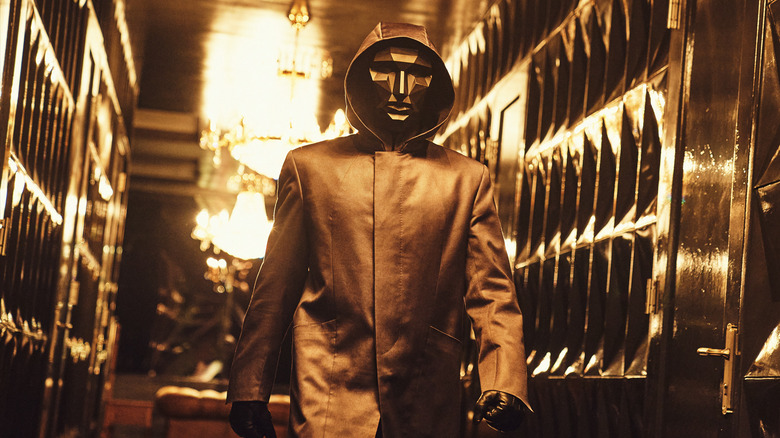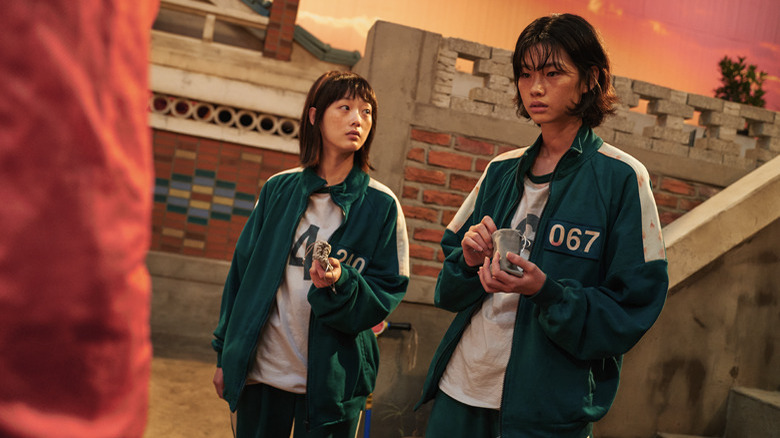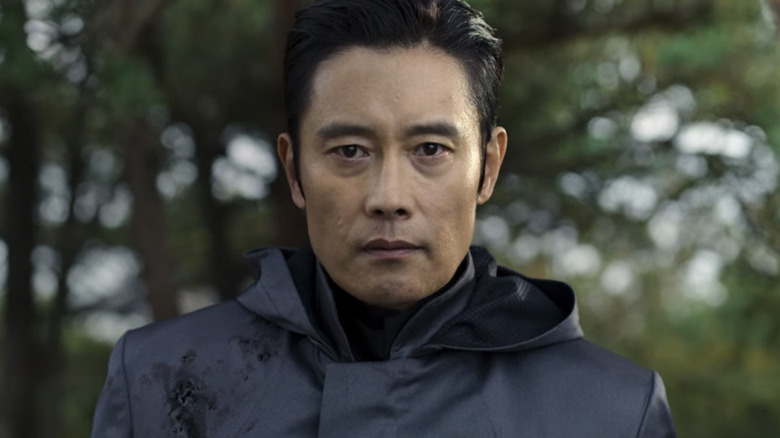The Squid Game Reference That Made Our Heads Explode
"Squid Game," writer/director Hwang Dong-Hyuk's devilishly clever smash-hit Netflix series, has been compared to plenty of other projects because of its premise – the most frequent of which are probably "Battle Royale" and "The Hunger Games," two movies that also use the twisted "cram people together and gamify them killing each other" structure. Interestingly, the show itself does not contain many overt references to other pieces of pop culture. But there is one reference in the show's sixth episode that planted the seed for an important reveal later in the series – a reveal which, in hindsight, raises a squid-ton of questions about the world these characters are living in. Warning: spoilers ahead.
The Reference
In the sixth (and most emotionally devastating) episode of "Squid Game," Kang Sae-byeok (Jung Ho-yeon) pairs up with Ji-yeong (Lee Yoo-mi) for the marble game, only to quickly discover that one of them will die by the time the timer runs out. Instead of playing the game for the entire allotted time, the two women decide to sit and talk until the last minute, getting to know each other and sharing a human connection one last time.
At one point, Ji-yeong references the 2015 Korean film "Inside Men," quoting a line from that film ("Go to mojito and have a glass of Maldives"), but she's surprised to discover that Kang Sae-byeok does not understand the reference. "Haven't you seen that movie?" she asks. "The one with Lee Byung-hun."
In the moment, that reference plays as a somewhat innocuous reference: an example of the two women bonding with a tragic ticking clock over their heads. But a couple episodes later, that reference becomes a lot more complicated.
Why Our Minds Are Blown
In "Squid Game" episode 8, police officer Hwang Jun-ho (Wi Ha-jun), who has infiltrated the mysterious island where the deadly games are conducted, obtains evidence that the games have been happening for years. He escapes from the island to a nearby rocky outcropping, where he tries to text the evidence to his boss back on the Korean mainland. But the Front Man, who wears a black mask and organizes the games, hunts the officer to the side of a cliff. Before he shoots the officer, the Front Man reveals that he is actually Jun-ho's long-lost brother In-ho ... and, more importantly for the purposes of this conversation, we find out that he is played by actor Lee Byung-hun.
You might recognize him from American action movies like "Red 2," "Terminator: Genisys," "G.I. Joe: Retaliation," and the remake of "The Magnificent Seven," or from his more memorable work in Korean films like the delightfully bonkers western "The Good the Bad the Weird" or the bloody revenge/horror movie "I Saw the Devil."
But the decisions to both cast Lee Byung-hun in "Squid Game" and to keep Ji-yeong's "Inside Men" reference in the show's final cut leads to a fascinating crack in the reality of that narrative. When Ji-yeong watched that movie, did the man who starred in it look exactly like the Front Man, resulting in a "Julia Roberts plays a character who looks just like the real Julia Roberts in 'Ocean's Twelve'" situation? Does the actor Lee Byung-hun look different in the world of "Squid Game"? Is the filmmaker purposefully messing with the audience? (The latter option seems the most likely: that's not the type of thing that slips through the cracks as a mistake in the editing room when a single person wrote and directed every episode.)
This type of universe-shattering event has happened plenty of times before. Sylvester Stallone's Ray Tango references Rambo in 1989's "Tango & Cash," when Stallone had already famously played Rambo in multiple movies by then. In "Ace Venture: When Nature Calls," Jim Carrey's character references "The Shawshank Redemption," a movie which featured actor Bob Gunton in a key role; Gunton also plays a character in "Ace Ventura: When Nature Calls."
Truth be told, the "Squid Game" reference was probably meant as a fun little easter egg. But any time we get an excuse to recommend that people check out "The Good the Bad the Weird" or "I Saw the Devil," we're going to jump on it like it's a pane of tempered glass. (Man, "Squid Game" is messed up, huh?)


